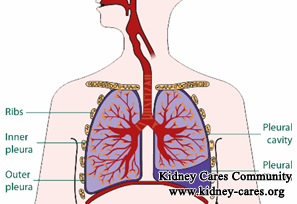 Search
Search
 Search
Search
 Pleural effusion in end stage renal disease (ESRD) is a common occurrence. This is because nearly all of kidney functioning cells are damaged in ESRD that causes hemorrhagic pleural fluid corrections, resulting in pleural effusion. A early diagnosis and prompt treatment is a must to deal with pleural effusion in ESRD.
Pleural effusion in end stage renal disease (ESRD) is a common occurrence. This is because nearly all of kidney functioning cells are damaged in ESRD that causes hemorrhagic pleural fluid corrections, resulting in pleural effusion. A early diagnosis and prompt treatment is a must to deal with pleural effusion in ESRD.
Symptoms of pleural effusion can help you find it early
When the effusion is less than 300ml, patients usually have no symptoms. However, as the amount of effusion increases, patients are more likely to develop shortness of breath, chest pain, pleuritic pain, fever or cough. If you have one or more of these symptoms, do a test to diagnose whether you have pleural effusion.
Tests for pleural effusion in end stage renal disease
An accurate diagnosis can guarantee you to take a correct treatment to some extent. The following are common tests used to identify pleural effusion:
- Computed tomograph (CT scan)
- Ultrasound
- Chest X-ray film
- Thoracentesis refers to taking a fluid sample
How to treat pleural effusion for ESRD patients?
Since pleural effusion in ESRD is due to that serosal injury associated with kidney damage allows transudation of fluid into the pleural space. Therefore, the effective treatment should not only include management for pleural effusion but also kidney repair treatment.
To deal with pleural effusion, there are several treatment options, namely, tube thoracotomy, pleurodesis, pleural drain and pleural decortication. After making clear the characteristics of your pleural effusion, the doctor can determine which one is suitable for you. If you haven’t accepted a useful treatment, you can ask help from the online doctor.
As for repairing damaged kidney cells, we suggest some herbal medicines. Compared with western medicines, these herbal medicines such as Chinese rhubarb and astragalus mongholicus have an outstanding superiority of increasing the self-curative ability of damaged kidney cells and prompting the regeneration of new tissues. As long as part of these cells recover to work, your GFR will be improved largely and your kidney disease may be reversed, too.
Both of these two treatments are necessary. What’s more, it needs the joint effort of the doctor and yourself to treat your pleural effusion radically. Any confusion about today’s topic, you can leave it in the form below and we will share the answer with you as soon as possible.